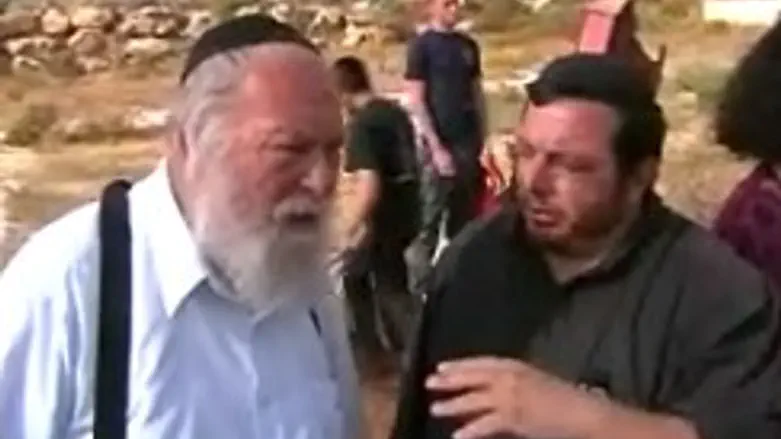
All eyes are on Israel. No subject stirs up greater passion, zeal, and raw emotion than that of the Jewish State. The luxury of neutrality is increasingly becoming an indulgence of the past as the nations of the world begin to strike definitive and unequivocal stances, nearly all of them markedly against the state of Israel.
They sanctimoniously condemn the most humane country in the world for crimes against humanity, censure us for occupying and oppressing the defenseless, and censure us for a colorful slew of concocted charges and accusations.
But what, really, is their beef with us?
This week's Torah Portion illuminates this age old question. At the beginning of the portion we find ourselves in one of the darkest points in Jewish History. We happen upon the "sin of the spies", in which 10 out of 12 of the nation's leaders were sent on a reconnaissance mission to the Land of Israel to prepare for the upcoming conquest and settlement.
However, they came back bearing foreboding news, rife with fear, doubt, and projection. This ended with the death of the spies and the declaration that the entire generation would die out in the desert, other than Yehoshua and Calev (Joshua and Caleb) who merited to enter the Land of Israel by proving that they were of a different spirit; a different generation.
Then comes Korach, casting aspersions against Moshe's character, accusing him of nepotism and abuse of power. In a moral lesson that resonates through the ages,
Ethics of our Fathers (5:20) explains "Every argument (Machloket) which is for the sake of heaven ("LeShem Shamayim") will ultimately endure, but every argument which is not for the sake of heaven will not endure. And what is an argument (or debate), which is for the sake of heaven?
This is the "argument" of the students of Shammai and the students of Hillel (literally: "Beit Hillel U'beit Shammai, the Houses of the great sages Hillel and Shammai.who argued over legal interpretations of the Talmud)
"And what is an argument which is not for the sake of heaven (and therefore which will, suggests the Mishnah, not endure)? This is the argument of Korach and his congregation."
It is clear that Korach was not arguing against Moshe as an expression of his selfless desire to serve his creator in the deepest and most sincere way possible, rather he was rebelling against Moshe for his own personal gain. He wanted to be exalted, to acquire power, and to be granted prestige. So he threw up a smokescreen of pretexts and premises to undermine Moshe's rulership and authority and usurp it for himself.
Notice, however, that Ethics of our Father does not say "the argument of Korach and Moshe", but rather "Korach and his congregation". It seems that Moshe Rabbeinu was at such a level of clarity that his razor sharp perception pierced through Korach's veil of accusations, exposing him to a greater clarity on Korach impulses and motivations than even Korach himself may have had.
Such was his lucid grasp of the situation that Moshe did not even get drawn in to the debate, much like a father would not
enter into a serious debate with his toddler. This was a one way debate and Moshe did not even dignify the allegations
by responding to them, rather he turned it over to Hashem (G-d).
As a nation we need to tap into the spiritual resources of Moshe Rabbeinu. We need to harness the Mosaic energy deep within and achieve an internal peace and knowledge of the truth and justice of our cause. I, and many others, have spent much time composing and articulating compelling arguments contending with the ridiculous accusations being leveled at us daily, yet the onslaught of hypocritical finger pointing shows no sign of abating.
We must know and remember that these accusations against our nation are no less a façade than were those of Korach. The nations of the world understand on a very primal, perhaps even subconscious, that the Jewish People are G-d's chosen and represent Him in the world. Every element of the nation of Israel is a testimony to G-d's rule and dominion over all humanity, all of creation, and the entire world.
They understand that sublimating or destroying the Jewish People is tantamount to sublimating or destroying G-d. This of course would make them gods in their own right and relieve them from the odious lurking knowledge that they are the creations and not the creators, and that they must answer to a higher authority. This truth they can not endure and they will stop and nothing to eradicate it from the world.
We need to be the nation of Moshe, a nation of loving teachers who share the word of G-d with each other and with the world. Let us liberate ourselves from our paradigm of defensiveness and reaction to a perspective of righteous confidence.
Rather than address the arguments wielded against us, let us understand and identify their underlying cause. Let us heed the words of our great sage, Rashi, who says in his very first commentary in the Torah "For if the nations of the world should say to Israel: "You are robbers, because you have seized by force the lands of the seven nations of Canaan, they could say to them "The entire world belongs to the Holy One Blessed be He, He created it and gave it to whomever it was right in His eyes. Of His own will He gave it to them and of His own will He took it from them and gave it to us."
Let us finally do what we were created for; Let us finally teach the world about G-d.